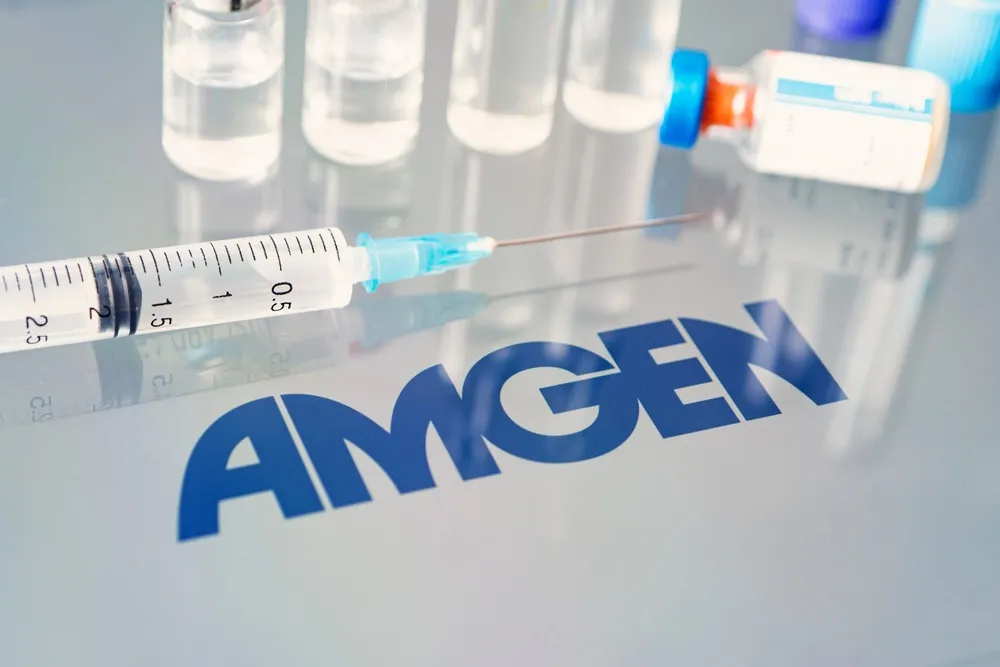
Amgen Reports Positive Phase 3 Results for Bemarituzumab in FGFR2b+ Gastric Cancer, Marking Milestone in Targeted Therapy
Amgen (NASDAQ:AMGN) has announced a significant breakthrough in the treatment of gastric and gastroesophageal junction (G/GEJ) cancer. The Phase 3 FORTITUDE-101 trial evaluating bemarituzumab, a targeted monoclonal antibody, in combination with chemotherapy (mFOLFOX6), has met its primary endpoint of overall survival (OS) in patients with unresectable, locally advanced, or metastatic FGFR2b-overexpressing G/GEJ cancer. The interim analysis revealed that patients receiving bemarituzumab plus chemotherapy experienced a statistically significant and clinically meaningful improvement in OS compared to those receiving placebo plus chemotherapy.
These results signal a potentially transformative advancement in the treatment landscape for a subset of patients with G/GEJ cancer who are non-HER2 positive and exhibit overexpression of the FGFR2b protein. FGFR2b overexpression in this study was defined as 2+/3+ staining in at least 10% of tumor cells, as measured by centralized immunohistochemistry (IHC) testing.
Addressing an Urgent Global Health Challenge
Gastric cancer remains one of the deadliest cancers globally, ranked as the fifth leading cause of cancer-related mortality. According to global cancer statistics, nearly one million new gastric cancer cases are diagnosed annually, resulting in over 650,000 deaths. The vast majority of patients are diagnosed at advanced stages of the disease, when treatment options are limited and prognosis is poor.
“Most patients with gastric cancer are diagnosed at an advanced stage, with poor prognosis, low survival rates, and limited therapeutic options,” said Jay Bradner, M.D., executive vice president of Research and Development at Amgen. “These first positive top-line results of an FGFR2b-targeted monoclonal antibody from our Phase 3 FORTITUDE-101 study mark a meaningful advance in the development of effective targeted therapy for gastric cancer.”
Safety and Tolerability
As with many cancer therapies, safety remains an important consideration. In the FORTITUDE-101 study, the most frequently reported treatment-emergent adverse events (occurring in more than 25% of patients treated with bemarituzumab plus chemotherapy) included reduced visual acuity, punctate keratitis, anemia, neutropenia, nausea, corneal epithelium defect, and dry eye. Ocular events, which were previously observed in Phase 2 trials of bemarituzumab, occurred more frequently and with greater severity in the Phase 3 treatment arm.
Despite these safety concerns, the overall benefit-risk profile remains favorable, particularly given the lack of effective first-line treatment options for this specific patient subgroup. The trial also incorporated more comprehensive ocular-related monitoring compared to previous studies, reflecting Amgen’s commitment to patient safety.
Amgen plans to present detailed results from the trial at an upcoming medical conference, which is expected to provide further insights into the efficacy and safety profile of bemarituzumab in this patient population.
Ongoing Development and Collaborations
The FORTITUDE-101 trial was conducted in collaboration with Zai Lab, which holds co-development and commercialization rights for bemarituzumab in mainland China, Hong Kong, Macau, and Taiwan. The trial enrolled 547 patients across 300 sites in 37 countries, making it one of the most expansive global efforts to evaluate a targeted therapy for FGFR2b-overexpressing gastric cancer.
Beyond FORTITUDE-101, Amgen is advancing another Phase 3 study evaluating bemarituzumab in combination with chemotherapy and nivolumab (a PD-1 immune checkpoint inhibitor) in first-line gastric cancer. Results from that trial are expected in the second half of 2025 and could potentially establish a new standard of care in this space.
Understanding FGFR2b as a Therapeutic Target
FGFR2b (fibroblast growth factor receptor 2b) is a member of the FGFR family of proteins involved in cell growth and proliferation. Aberrant FGFR2b signaling is increasingly recognized as a driver of tumor growth in certain cancers, including G/GEJ cancer. Overexpression of FGFR2b is found in about 38% of patients with advanced G/GEJ cancer, but more stringent criteria—defined as ≥10% of tumor cells with 2+/3+ membrane staining by IHC—apply to approximately 16% of patients, making this subgroup a critical target for precision medicine approaches.
The FORTITUDE-101 trial specifically enrolled patients whose tumors met this biomarker threshold and excluded those who were positive for human epidermal growth factor receptor 2 (HER2), another well-known target in gastric cancer. This allowed for the focused evaluation of bemarituzumab’s impact on FGFR2b-driven disease biology.
Looking Ahead
The success of the FORTITUDE-101 trial positions Amgen and its partners to potentially submit regulatory filings for bemarituzumab in FGFR2b-overexpressing gastric cancer. If approved, bemarituzumab could become the first targeted monoclonal antibody therapy specifically designed for this biomarker-defined population, addressing a substantial unmet medical need.
The announcement of these positive top-line results marks a turning point in the management of gastric and gastroesophageal junction cancers, where treatment options for biomarker-specific subgroups have remained limited. As Amgen prepares to share full data and explore further regulatory and clinical development, the oncology community will be watching closely for what could become a new standard of care in a historically difficult-to-treat cancer.





